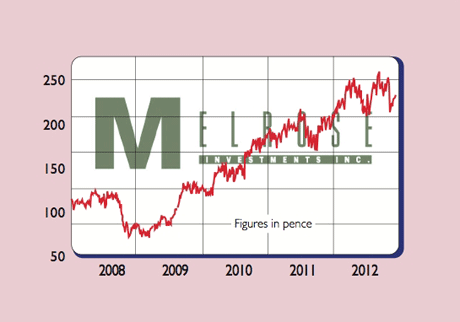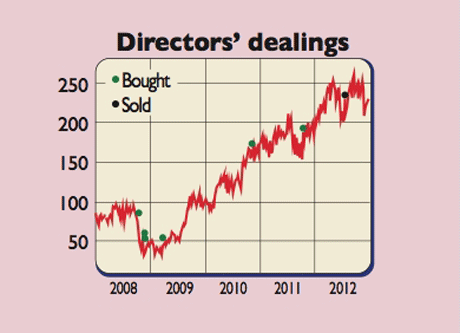Shares in focus: What’s better than a fund?
Melrose has an impressive record of turning companies around and selling them for profit. So should you buy the shares? Phil Oakley investigates.
Get the latest financial news, insights and expert analysis from our award-winning MoneyWeek team, to help you understand what really matters when it comes to your finances.
You are now subscribed
Your newsletter sign-up was successful
Want to add more newsletters?

Twice daily
MoneyWeek
Get the latest financial news, insights and expert analysis from our award-winning MoneyWeek team, to help you understand what really matters when it comes to your finances.

Four times a week
Look After My Bills
Sign up to our free money-saving newsletter, filled with the latest news and expert advice to help you find the best tips and deals for managing your bills. Start saving today!
Melrose will be a better custodian of your money than the City, says Phil Oakley.
The business
Melrose is an investment company with a difference it mainly targets engineering firms that it thinks are not achieving their potential. Shareholders are often asked for extra money to help it take them over, improve the way they are run and then sell them on for a profit.
A typical target is owned for at least three to five years, so at any one time Melrose owns a number of businesses in different sectors of the engineering market. So what does it own just now?
MoneyWeek
Subscribe to MoneyWeek today and get your first six magazine issues absolutely FREE

Sign up to Money Morning
Don't miss the latest investment and personal finances news, market analysis, plus money-saving tips with our free twice-daily newsletter
Don't miss the latest investment and personal finances news, market analysis, plus money-saving tips with our free twice-daily newsletter
Brush Turbogenerators makes electricity generating equipment for power stations as well as the oil and gas and industrial sectors. MarelliMotori makes industrial generators and electric motors. Melrose also has three firms that specialise in making products used in industrial lifting applications for the oil and gas and mining sectors.
In America it owns firms that make components for windows and patio doors, and equipment used in the scrap metal and waste recycling industries. Elster, the company's latest purchase, is the world leader in making gas meters.
The history
Melrose was founded in May 2003 by Christopher Miller, David Roper and Simon Peckham. The three had previously worked together for Wassall plc, an industrial investment company. After Wassall was taken over in 2000, they decided to form Melrose in order to go it alone and carry on investing in similar firms.
In October 2003, Melrose was listed on the Alternative Investment Market (Aim) for a value of £13m. After unsuccessfully trying to buy Mayflower and Novar plc in 2004, it asked its shareholders for £230m, and paid £429m to buy two companies, metal components supplier Dynacast and engineering group McKechnie, in May 2005. Two years later, it sold the McKechnie aerospace business for £458m, repaid all the money it had borrowed to buy it, and also handed back another £220m to shareholders.
In 2008, Melrose moved on to bigger things. It shelled out £1bn for underperforming industrial company FKI. Dynacast was then sold in 2011. By then, Melrose had made more than £1bn from the cash flows and sales proceeds of its first two businesses or four times the equity invested. By the end of 2011, another £373m had been handed back to shareholders. In August 2012, Melrose raised another £1.2bn from shareholders to buy Elster for £1.5bn. The deal saw Melrose become a member of the FTSE 100 for the first time.
The chief executive
One of the founders of Melrose, Simon Peckham, has been the chief executive since May this year. He started out as a solicitor before becoming corporate development director at Wassall plc. Prior to setting up Melrose he spent three years working for RBS in the equity finance business.
After recently announcing a profit warning, he ruffled a few feathers in the British engineering sector by saying that Melrose had been much more honest about tough business conditions than many of its peers. He took home just over £800,000 last year.
Should you buy the shares?
As the profit warning shows, times are getting a little tougher for Melrose. This should not be surprising, given the challenging outlook for many economies around the world. However, it's worth remembering that sales and profits are still growing just not as fast as people had previously expected. More importantly, you do not buy or sell shares in a company like Melrose on the back of the short-term trading outlook.
What investors really need to think about is whether or not the management team can increase the value of its businesses over the medium term. And there's no doubt that Peckham, Miller and Roper have a rather impressive track record when it comes to this.
Unlike traditional fund managers who are exposed to the ups and downs of the stockmarket, the team at Melrose is running proper businesses. It has a lot more influence over the value of its investments than someone running a portfolio of shares. Melrose has specialised in buying businesses that were starved of investment and then spending money to put them on a sounder long-term footing.
There is little doubt that FKI is worth a lot more than the sum Melrose paid for it four years ago the directors estimate that it is worth 2.5 times the equity invested. The medium-term outlook for most of its businesses remains good as well. They get a lot of their revenues from the energy and oil and gas sectors, while a recovery in the American housing market should help its Truth Hardware business. Efficiency gains should boost sustainable profit margins too.
A lot rests on the performance of German company Elster, Melrose's most recent purchase. A key supplier of meters to gas, electricity and water companies, Elster has the potential to become a major supplier of smart meters' devices that tell people and businesses how much energy they are using so they can try and save money.
Some analysts are concerned that Melrose may have paid too much for Elster. But with nearly £1.2bn in sales, growth and efficiency gains have the potential to add a lot of value for Melrose shareholders. The stockmarket has lost a bit of enthusiasm for Melrose's shares following its frank assessment of its own trading conditions. But this looks like a good opportunity for patient long-term investors to get in at a reasonable price. Given the excellent pedigree of Melrose's management, we see them as rather better custodians of your money than most fund managers in the City. That's why we'd rate it a buy'.
VERDICT: LONG-TERM BUY
The numbers

Stockmarket code: MRO
Share price: 227p
Market cap: £2.9bn
Net assets (June 2012): £616m
Net debt (June 2012): £306m
P/e (2013 estimate): 13.1 times
Yield (prospective): 3.4%
Interest cover: 4.4 times
What the analysts say
Buy: 9
Hold: 4
Sell: 0
Average price target: 255p
Directors' shareholdings

S Peckham (CEO): 9,664,068
G Martin (FD): 4,758,797
C Miller (chairman): 14,175,344
Get the latest financial news, insights and expert analysis from our award-winning MoneyWeek team, to help you understand what really matters when it comes to your finances.
Phil spent 13 years as an investment analyst for both stockbroking and fund management companies.
-
 Can mining stocks deliver golden gains?
Can mining stocks deliver golden gains?With gold and silver prices having outperformed the stock markets last year, mining stocks can be an effective, if volatile, means of gaining exposure
-
 8 ways the ‘sandwich generation’ can protect wealth
8 ways the ‘sandwich generation’ can protect wealthPeople squeezed between caring for ageing parents and adult children or younger grandchildren – known as the ‘sandwich generation’ – are at risk of neglecting their own financial planning. Here’s how to protect yourself and your loved ones’ wealth.
-
 Somero: trading this overlooked bargain
Somero: trading this overlooked bargainFeatures Mechanical-screed maker Somero dominates its niche and is attractively valued. Matthew Partridge picks the best way to trade it.
-
 How to find big profits in small companies
How to find big profits in small companiesCover Story The small- and micro-cap sectors are risky and volatile. But with careful research and patience, investors could make huge gains. Matthew Partridge explains how to find the market’s top tiddlers.
-
 The hidden gems on Aim, London's junior market
The hidden gems on Aim, London's junior marketFeatures Aim, London’s junior market, is risky – but you can find solid stocks at low prices. Scott Longley reports.
-
Three Aim-listed firms that will thrive in a post-Brexit world
Opinion Matt Tonge and Victoria Stevens of the Liontrust UK Smaller Companies Fund pick three Aim-listed firms that will survive Brexit turmoil.
-
Fetch! The Chinese small-cap stocks to buy in the Year of the Dog
Opinion Each week, a professional investor tells us where she’d put her money. This week: Tiffany Hsiao of Matthews Asia selects three Chinese small-cap stocks with exciting potential.
-
Small and mid-cap stocks with big potential
Opinion Professional investor Guy Anderson of the Mercantile Investment Trust selects three small and medium-sized firms with promising prospects that the market has missed.
-
 Get cheap, reliable growth from smaller companies
Get cheap, reliable growth from smaller companiesFeatures One of the most reliable long-term investment trends is the long-term outperformance of smaller companies over blue chips. Max King picks some of the best ways to buy into this growth.
-
 Now the bitcoin bubble’s burst, what’s the next big thing?
Now the bitcoin bubble’s burst, what’s the next big thing?Features Forget bitcoin, if you want to increase your wealth faster than most other people, you need to find the next big thing. Merryn Somerset Webb suggests some places to look.